Chapter 2
Muslims and The People of The Book In The History of Islam
Everyone looking at the history of Islam since very early times and at the position of Christians and Jews under Islamic administration with an unbiased eye will encounter one very obvious fact: The People of the Book have always lived in peace and security under Islamic rule. Indeed, Christians and Jews who were persecuted under the rule of different faiths and sects from time to time sought refuge in Islamic lands and found the security they sought in Muslim countries. The main reason why the People of the Book were able to live in such peace and comfort is that Muslims form their attitudes and behavior toward the People of the Book according to the moral values of the Qur’an.
The Prophet Muhammad’s (may Allah bless him and grant him peace) Loving and Affectionate Morality Must Serve As a Role Model for All Muslims
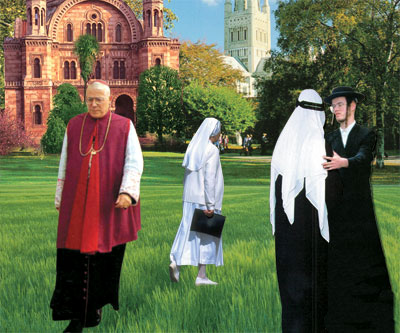 |
In the time of the Prophet Muhammad (may Allah bless him and grant him peace), Arabia was home to communities of different religions, cultures and ideas. Jews, Christians, Sabians, Zoroastrians and idol worshippers all lived side by side, together with many different tribes hostile to each other. Yet no matter what their tribe or beliefs are, our Prophet (may Allah bless him and grant him peace) called people to faith in Allah with affection, patience, compassion and love. in the Qur’an Allah describes his pleasing attitude to those around him as follows:
It is a mercy from Allah that you were gentle with them. If you had been rough or hard of heart, they would have scattered from around you. So pardon them and ask forgiveness for them... (Surah Al ’Imran: 159)
As pointed out earlier, the Qur’an reveals that no one should be pressured to embrace Islamic morality. Muslims are charged only with explaining the religion of Allah. No one can force anyone else to believe or worship. One can find the true path and come to believe, only by the Will of Allah. Our Prophet (may Allah bless him and grant him peace) always scrupulously abided by that prohibition and stated frequently that a man could live by religious morality only when, in his heart, he really wanted to. Allah told our Prophet (may Allah bless him and grant him peace) in one holy verse how he should behave towards those around him:
We know best what they say. You are not a dictator over them. So remind, with the Qur’an, whoever fears My Threat. (Surah Qaf: 45)
We have appointed a law and a practice for every one of you. Had Allah willed, He would have made you a single community, but He wanted to test you regarding what has come to you. So compete with each other in doing good. Every one of you will return to Allah …..
(Surat Al-Ma'ida: 48)
In one hadith our Prophet (May Allah bless him and grant him peace) says: »I was sent as a tolerant, seeker after Allah (one from the faith of the Prophet Abraham (pbuh)), and whoever opposes my Sunna is not one of us.” ."1Elsewhere he tells believers »I was sent to be compassionate and a peace-maker...”"2This superior moral virtue of our Prophet (May Allah bless him and grant him peace) is expressed as follows:
Someone who responds with gentleness (who controls his earthly passion) when angered will merit the love of Allah! 3
There are many hadith concerning the compassionate, loving and tolerant qualities of our Prophet (may Allah bless him and grant him peace). For example, the Prophet (may Allah bless him and grant him peace) says: “Allah will have no compassion on he who has no compassion for other people." 4Other passages read:
Be merciful, that you may be shown mercy. Forgive, that you may be forgiven. Shame on those who speak too much. Shame on those who know their sins but persist in them.5
Allah is loving and merciful, He loves gentleness, and what He gives from gentleness He gives with nothing else.6
The great Islamic scholar Imam Ghazzali summarizes the information he collected in the hadith regarding our Prophet’s (may Allah bless him and grant him peace) attitude to those around him:
He was far from knowing anger and quickly showed compassion for things. He was the most loving of men toward other people. He was the most auspicious of men and did the most good to others, and the most useful and beneficial to others.7
The human love, consideration and affection of our prophet (may Allah bless him and grant him peace) that bound those around him to the religion and warmed their hearts to faith is a superior moral virtue that all Muslims must concentrate on. Allah revealed these moral virtues of our Prophet (may Allah bless him and grant him peace), a role model for all mankind, in Surat At-Tawba:
A Messenger has come to you from among yourselves. Your suffering is distressing to him; he is deeply concerned for you; he is gentle and merciful to the believers. (Surat At-Tawba: 128)
Love, affection, tolerance and compassion are shared virtues among the messengers sent by Allah as guides to salvation. Allah reveals in the Qur’an that He has bestowed “sensitivity to love” on other prophets, and cites the Prophet John (pbuh), on whom He bestowed knowledge from His Presence, as a model on this subject. He describes this holy personage as having “...tenderness and purity from Us - he had takwa (respectful fear of Allah).” (Surah Maryam: 13) Therefore, Muslims who believe and follow in the path of the messengers must also have moral values built on affection, love and compassion. When believers truly live by these moral values commanded by Allah, they will see that many issues that appear to be problematic are easily resolved, that peace and security will spread and that abundance and plenty will reign.
The Prophet Muhammad’s (may Allah bless him and grant him peace) Exemplary Approach toward the People of the Book
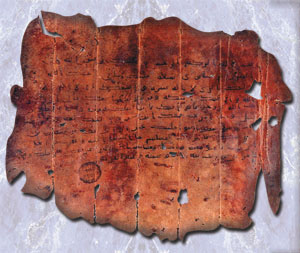 |
| Six of Prophet Muhammad's (may Allah bless him and grant him peace) original letters inviting various kings and provincial governors to Islam have been preserved. These historic documents show his supreme virtue, forgiveness and affection toward others, and his determination to teach Islam. Rulers and their subjects were invited in the most appropriate way to live the true religious life, and their accepting and effective language have led many people to believe in Islam. The wisdom inherent in our Prophet's (may Allah bless him and grant him peace) style is an example for all Muslims to follow. The above letter was sent to al-Mundhir bin Sawa, Ruler of Bahrain. The letter reads: "... Peace be upon you! I praise Allah with no associate, and I bear witness that Muhammad is His servant and Messenger. Thereafter, I remind you of Allah, the Mighty, the Glorious. Whoever accepts admonition, does it for his own good. Whoever follows my messengers and acts in accordance with their guidance, he, in fact, accepts my advice..." |
The Prophet Muhammad (may Allah bless him and grant him peace), the best role model for Muslims who deal with the People of the Book, was always tender hearted, just and compassionate toward Jews and Christians and tried to create an atmosphere based on reconciliation and love among these three religious communities. Various agreements and guarantees allowed Christians and Jews to live as autonomous religious communities. When the young Muslim community was still suffering from the Meccan polytheists’ cruelty and oppression, our Prophet (may Allah bless him and grant him peace) advised some of them to seek refuge with the Christian king of Ethiopia, Negus (or al-Najashi). The Muslims who later on migrated to Madinah with our Prophet (may Allah bless him and grant him peace), on the other hand, developed a model of coexistence with that city’s Jewish community that was to become a model for all later generations. The Muslims’ acceptance of Jews and Christians during the period of Islam’s expansion in Arabia entered the history books as an example of justice and understanding.
One such example was our beloved Prophet’s (may Allah bless him and grant him peace) words written in the text of an agreement prepared for the Christian Ibn Harris bin Ka`b and his co-religionists: »The religion, churches, lives, chastity, and goods of all Christians living in the East are under the protection of Allah and all believers. None of those living by Christianity will be forced to turn to Islam. If any Christian is subjected to any killing or injustice, Muslims must help him.8
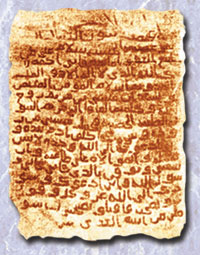 |
| Six of Prophet Muhammad's (may Allah bless him and grant him peace) original letters inviting various kings and provincial governors to Islam have been preserved. These historic documents show his supreme virtue, forgiveness and affection toward others, and his determination to teach Islam. Rulers and their subjects were invited in the most appropriate way to live the true religious life, and their accepting and effective language have led many people to believe in Islam. The wisdom inherent in our Prophet's (may Allah bless him and grant him peace) style is an example for all Muslims to follow. The above letter was sent to al-Mundhir bin Sawa, Ruler of Bahrain. The letter reads: "... Peace be upon you! I praise Allah with no associate, and I bear witness that Muhammad is His servant and Messenger. Thereafter, I remind you of Allah, the Mighty, the Glorious. Whoever accepts admonition, does it for his own good. Whoever follows my messengers and acts in accordance with their guidance, he, in fact, accepts my advice..." |
The Prophet Muhammad (may Allah bless him and grant him peace) allowed the Jews to become a party to the Constitution of Madinah signed with the Aws and Khazraj clans, which permitted them to continue living as a separate religious community. The basis for this compassion and understanding of the Jews’ faith and traditions was laid down in the following article: »The Jews of Banu Awf [non-Muslim minorities] are a community along with the believers. To the Jews their religion, and to the Muslim their religion.
As a requirement of the morality ordained by Allah, the Prophet Muhammad (may Allah bless him and grant him peace) not only showed compassion and understanding toward the People of the Book, but also taught his Companions that those Jews and Christians living under the rule of Islam must be protected. The privileges that he granted them in the settlements of Adruh, Maqna, Khaybar, Najran, and Aqaba prove that Muslims both guaranteed these non-Muslims’ lives and property and recognized their freedom of belief and worship. The following articles of the agreement between our Prophet (may Allah bless him and grant him peace) and the Christians of Najran need to be pointed out:
To the Christians of Najran and the neighboring territories, the security of Allah and pledge of His Prophet are extended for their lives, their religion, and their property - to those present as well as those absent and others besides;
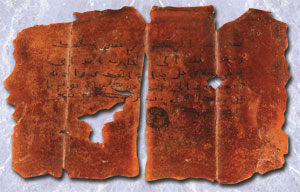 |
| The original of the letter sent by the Prophet Muhammad (may Allah bless him and grant him peace) to Shamir al-Ghassani, king of Ghassan. |
No bishop shall be removed from his bishopric, nor any monk from his monastery, nor any priest from his priesthood, and they shall continue to enjoy everything great and small as heretofore... They shall not oppress or be oppressed.
If anyone demands his right from you, justice will be maintained between you.Neither you will be oppressed, nor will you be allowed to oppress others.9
In addition, according to some accounts, our Prophet (may Allah bless him and grant him peace) attended their weddings, visited their sick, and was generous to them. The Prophet Muhammad (may Allah bless him and grant him peace) even spread out his cloak so that the Christians of Najran who came to visit him could sit on it. Following his death, the Muslims’ moral conduct toward the People of the Book continued to be based on the compassion that the Prophet Muhammad (may Allah bless him and grant him peace) had shown to them throughout his life.
Muslims’ Attitude Towards The People Of The Book Must Be In Agreement With The Affectionate Attitude Of Our Prophet
(may Allah bless him and grant him peace)
ADNAN OKTAR: Our beautiful Prophet (may Allah bless him and grant him peace) was very compassionate towards Christians. He would go and eat with them, eat their food. He would also trade with the Jews and encourage his companions to do so. In that era both Christians and Jew lived their lives as if they were in Heaven. It was a term of peace and splendor for them.
ADNAN OKTAR: People of the Book is entrusted to us, this has been the same in Ottoman times as well as during the time of our Prophet (may Allah bless him and grant him peace). We see the same in the Qur’an and we are obliged to protect and shelter them, to show compassion towards them and love them. We just do not conform to their beliefs, but we love them very much as human beings and our brothers and embrace them. However if they say (Allah is beyond this) Allah is one of the three; of course we say without doubt Allah is One, so therefore we would not agree with them. So in this aspect we never abide by their guidance and we do not obey them. But we are surely in unity on righteous morals and they are definitely our brothers.
ADNAN OKTAR: Our Prophet (may Allah bless him and grant him peace) used to meet with Jews, do business with them and have relations with them. He also had relations with Christians, and that is not a crime.
Freedom of Belief and Worship under the Islamic Administration
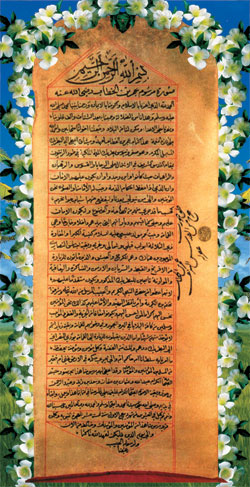 |
| Caliph Umar's declaration to the Orthodox patriarch Sophronios in 638. This declaration guaranteed all of the Christians' rights in the Holy Land. |
Beginning at the time of the Prophet Muhammad (may Allah bless him and grant him peace) there has always been freedom of religion in Muslim-ruled lands. Muslims protected the Christians’ and Jews’ belief systems, rituals, churches and synagogues, and schools of religious education. Articles guaranteeing the protection of monasteries and churches have been important parts of all agreements signed between Muslims and the People of the Book. Early agreements also allowed Muslim travelers to rest in the monasteries located along the travel routes. This suggests that Muslims were attempting to develop their relationship with the People of the Book on mutual respect and that they were taking pains to establish friendly relationship with them. Historical documents reveal that many Muslims visited monasteries to rest for the night, to enjoy a meal, or even to have a civilized conversation during their travels or campaigns.
The People of the Book often responded warmly toward Muslims. The following expressions were recorded in an agreement signed by Caliph Umar, which was presented to Abu Ubayda by the Syrian Christians:
[We imposed these terms on ourselves: ]… not to withhold our churches from Muslims stopping there by night or day; to open their doors to the traveler and wayfarer; …to entertain every Muslim traveler in our customary style and feed him… We will not abuse a Muslim, and he who strikes a Muslim has forfeited his rights.10
As the following verse; »if Allah had not driven some people back by means of others, monasteries, churches, synagogues, and mosques, where Allah’s name is mentioned much, would have been pulled down and destroyed,« (Surat Al-Hajj: 40) points out, Jewish and Christian places of worship are regarded by Muslims as holy places in which Allah’s name is remembered. Thus, as it is their responsibility to protect such places, throughout Islamic history all Jewish and Christian houses of worship have been protected so that the Jews and Christians can pray and worship in them as they please.
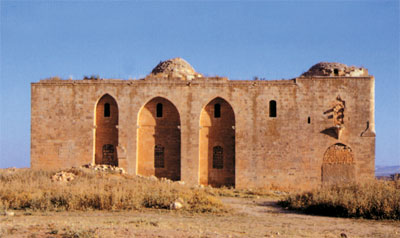 |
| The Deyr Yakup Monastery in Edessa (Urfa), first century |
For instance, historic documents signed during Abu Bakr’s (ra) reign state that the Christians of the peacefully taken city of Tabarriya were given guarantees that their churches would not be harmed. Likewise, the agreement signed after the conquest of Damascus stated that churches would not be destroyed or occupied. Umar’s (ra) covenant to the people of Jerusalem guaranteed the protection of all places of worship.
During the conquest of the Armenian city of Dabil (Dvin) in Uthman’s (ra) time, the assurances given to Christians, Jews, and Zoroastrians guaranteed the protection of all places of worship.11Permission to restore damaged churches and build new monasteries was never withheld.
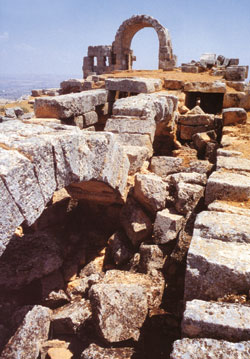 |
| The Germus village church in Edessa (Urfa) |
For instance, the St. Sergius monastery outside of Medain was destroyed by Patriarch Mar Amme and rebuilt during Uthman’s reign. Uqba, the governor of Egypt, contributed to a Nestorian monastery, the Church of Edessa was restored during the reign of Mu’awiyya, and the Saint Marcos Church was built in Alexandria. These are just a few examples of this tradition. The continued existence of churches and synagogues in Palestine, Syria, Jordan, Egypt, and Iraq proves the Muslims’ respect for the other divinely revealed religions. The Sinai Monastery with a mosque right next door is an important pilgrimage center on Mount Sinai and an example of the respect Muslims showed to the places of worship of the People of the Book.
Under Islamic rule, the People of the Book have always celebrated their religious festivities as they pleased. From time to time, the Muslim leadership even attended them. A letter by the Nestorian Patriarch Isho’yab III (650-60) reveals the Muslim leaders’ compassion and understanding toward the People of the Book:
They [Abbasids] have not attacked the Christian religion, but rather they have commended our faith, honored our priests... and conferred benefits on churches and monasteries12
Benjamin of Tudela, a famous twelfth-century Jewish explorer who could not conceal his astonishment when he discovered such attitudes in the Islamic world, expressed the impossibility of such religious understanding and pluralism in Christian Europe. He also stated that Jews and Muslims prayed together in holy places and at the tombs of holy people; that mosques were built next to synagogues, and that different congregations celebrated each other’s religious festivities.13
| There are many historical places of worship and holy places in Jerusalem and its vicinity. The area is sacred to all Muslims, Jews, and Christians. Many monasteries and churches dating back to the fourth century have been preserved. Under Muslim administrators, Jews, Christians, and Muslims freely prayed in their respective places of worship and lived in peace and security. Alliances of genuine believers can recreate the same atmosphere of tranquility today. | ||
 | ||
| The history of the St. George monastery in Ariha goes back to the fifth century. | The St. Sabbas Monastery was built at the beginning of the fourth century | A painting depicting Mt. Sinai |
These historical facts reveal that, contrary to much of what we read today, Islam is a religion of peace and love. Christians and Jews lived freely under Muslim rule and enjoyed the freedoms of religious belief and thought.
Only argue with the People of the Book in the kindest way – except in the case of those of them who do wrong – saying, "We believe in what has been sent down to us and what was sent down to you. Our God and your God are one and we submit to Him." (Surat Al-Ankabut: 46)
The Tranquility the People of the Book Experienced under Muslim Rule
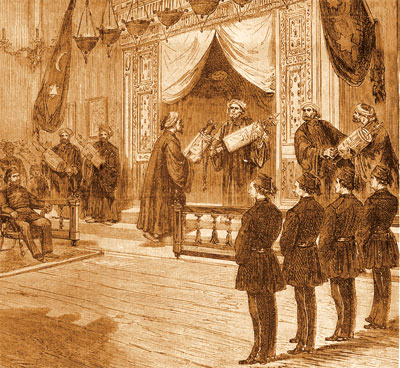 |
| Under Ottoman rule, Jews, Christians, and Muslims lived as friends, and the People of the Book were content with the Muslims' administration. This engraving depicts the prayer ceremony in the Ahida Synagogue held for the Ottoman army's victory against the Russians. The ceremony was attended by the grand vizier. |
Christians and Jews enjoyed the highest degree of freedom and love under Muslim rule. During the first few centuries of the Christian era, Jews oppressed Christians; as the latter became more powerful, they began to oppress Jews and even fellow Christians belonging to other sects. The Middle Ages were dominated by the Catholic church’s oppression of all Jews and Christians who did not agree with its teachings. Some non-Catholics sought refuge with the Muslims. The oppression and violence directed by Byzantium against the Egyptian Monophysite and the Jacobean Christians, the horrors endured by those Jews and Orthodox Christians who found themselves in the path of the Catholic Crusaders, and the persecution endured by the Jews of Europe, as well as by the Muslims and Jews in Spain after the Reconquista, have never occurred on Muslim soil.
The Ottoman Empire set an example of this highly compassionate attitude. The Patriarch of Antalya, Makarios, compared the tyranny of Catholic Poland against the Orthodox population with the Ottoman administration and concluded:
We mourned the thousands of people, men, women, and children killed by those heathens. The Polish wish to exterminate people of the Orthodox faith. May Allah make the Turkish state eternal, because they do not interfere with the Jews or Christians, provided they pay their taxes.14
Jews escaping Spanish tyranny found the peace and security they sought on Ottoman soil. Driven out of Spain and faced with more hardship in other countries where they sought refuge, many died of hunger and thirst at the gates of towns and cities they were not permitted to enter. Jews who boarded Genoese ships were either exploited or sold to pirates. Sultan Bayazid welcomed the Jews into his empire and demanded that the people show them the respect and affection to which they were entitled.
The order proclaimed not to refuse the Jews entry or cause them difficulties, but to receive them cordially.15Sultan Bayazid is known to history as a religious man, and his hospitality and affection were based on the Qur’an’s morality.
The people with the strongest claim to Abraham are those who followed him and this Prophet and those who believe. Allah is the Protector of the believers. (Surah Al 'Imran: 68)
Another example of the comfortable and prosperous lives led by Jews on Muslim soil was seen in Muslim Andalusia. This state, which founded the most advanced civilization in Europe at that time, was characterized by the understanding exhibited toward members of different faiths. Andalusia was gradually weakened due to the constant attacks of Spanish Christians. Granada was its last stronghold, and historic documents state that »those who have not seen the splendor of Jewish life do not know what splendor is.« At that time, Granada was the safest place on Earth for Jews.16
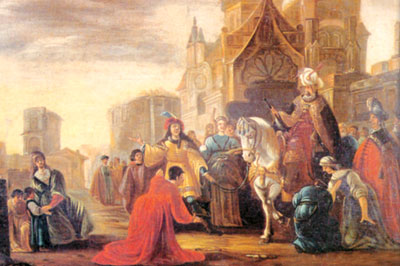 | 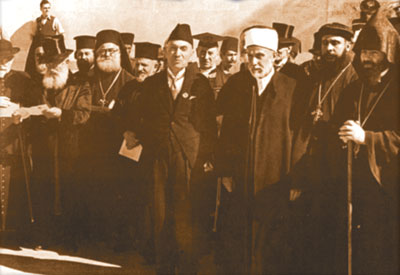 |
| A painting depicting the arrival of the sultan and his entourage in a Christian city and the spectacular welcome he received. Unknown, seventeenth century. | The above picture shows Catholic, Orthodox, Jewish, and Muslim religious leaders together in Palestine. The peace brought to the area ended with the Ottoman Empire's collapse. Creating peace will be possible only by establishing an alliance of all genuine believers. |
Another example is Palestine, where Jewish and Christian communities enjoyed religious freedom, lived in peace and safety, and engaged in trade and crafts. The Ottoman Empire guaranteed peace and security for some five centuries in the area, and such order has never been seen there since. The freedoms enjoyed in Jerusalem and its surrounding area under Ottoman rule is described by one of Israel’s ex-foreign ministers, Abba Eban, as follows:
Jerusalem and the Jewish nation suffered bloodshed and torture from the Romans and every other occupying force. Only after the conquest of Jerusalem by Sultan Yavuz Selim and its fortification by Kanuni did the Jewish nation discover what humanity, equality, and a peaceful life meant.17
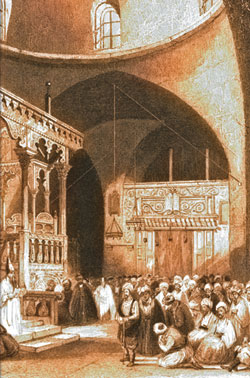 |
| A sermon by the chief rabbi of the great synagogue of Jerusalem, 1836. Jews living under Ottoman rule practiced their religion in complete freedom. |
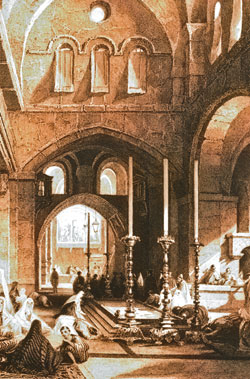 |
| The Church of the Holy Sepulcher visited by Christian pilgrims, 1836. Christian pilgrims could visit Palestine, then under Muslim administration, as they wished and worship freely. |
Throughout the Muslim world, Muslims, Christians, and Jews lived together in peace and tranquility for centuries. The People of the Book engaged in commerce and acquired property as they wished, engaged in the trade or profession of their choice, and were appointed to posts in the state administration and even in the sultan’s palace. They enjoyed the freedom of thought and expression at the highest degree, and made scientific and cultural achievements that are still with us today. They were not denied their social rights, and enjoyed maximum freedoms of belief and worship. For instance, historical sources reveal that Christian physicians in the Abbasids’ palace could read the Gospel with their families and staff, and no one interfered with their worship.
The importance of science and scientists in the Islamic world guaranteed the caliphs’ patronage of Christian and Jewish scientists. Scientists of various religious denominations would meet at state-organized gatherings to discuss scientific matters. Jewish and Christian physicists would exchange views with their Muslim counterparts, and many medical works would be discussed in the presence of the caliph or his bureaucrats.18
Living under the Islamic rule, the People of the Book took part in the bustling cultural life. Muslim leaders extended their cultural patronage to the lands they conquered and imported them to Baghdad, capital of the empire, where they would be studied by Muslim, Christian, and Jewish scientists. Each of them in turn, could teach their works based on these studies alongside their own religious beliefs. At a time when Muslims supported science and freedom of thought, Europe, the center of Christianity, had Inquisition courts that burned people at the stake for their heretical, meaning non-Catholic, thoughts or religious beliefs.
The Muslim leaders’ sense of justice led many Christians and Jews to bring their cases to Islamic courts, even though they had their own courts with their own laws. At one time, the Nestorian patriarch Mar Timothee I (780-825) even circulated a decree to counteract the ever-increasing number of Christians taking their cases to Islamic courts.19
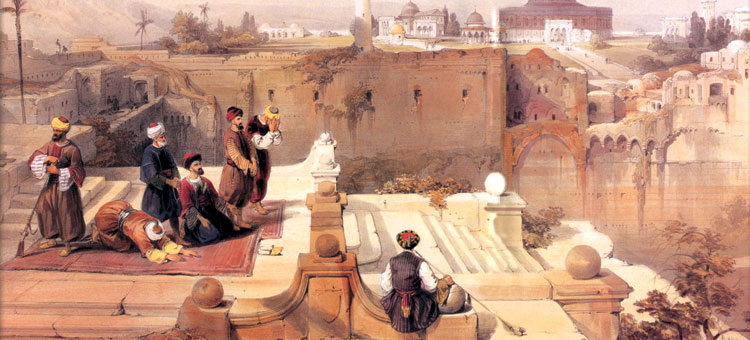 |
| "The Mosque of Omar on the Ancient Site of The Temple," by David Roberts, Mathaf Gallery, London |
This unequalled compassion and justice in Muslim lands was based on the Qur’an’s morality. Muslim leaders who adopted such ethical standards always achieved security, peace, and justice in their domains. These administrations’ priority was the public’s happiness and prosperity; therefore, they established systems that set the standards for future generations. When these same values of compassion, mercy, justice, understanding, modesty, patience, selflessness, and devotion derived from the Qur’an’s morality begin to pervade today’s societies, it will be possible to create a world order in which all people will find peace and security.
Glory be to Him Who took His servant on a journey by night from the Sacred Mosque [Masjid al-Haram] to the Further Mosque [Masjid al-Aqsa], whose surroundings We have blessed, in order to show him some of Our Signs. He is the All-Hearing, the All-Seeing. (Surat Al-Isra: 1)
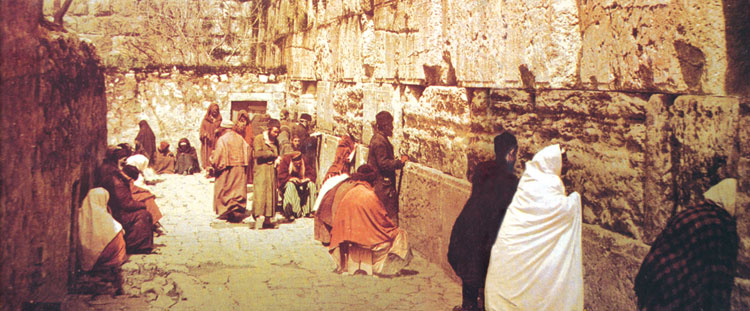 |
| A photograph of the Wailing Wall, 1900. |
Among the people of the Book there are some who believe in Allah and in what has been sent down to you and what was sent down to them, and who are humble before Allah. They do not sell Allah's Signs for a paltry price. Such people will have their reward with their Lord. And Allah is swift at reckoning. (Surah Al 'Imran: 199)
Muslims Must Look After The People Of The Book
From Mr. Adnan Oktar’s live interview on Mavi Karadeniz TV, February 3rd , 2009
ADNAN OKTAR: All the devout Jews in Israel must be looked after very carefully. We must look after their interests in the same way we look after those of Palestine. In other words, they are all ours from top to bottom. Some are the sons of Jacob (pbuh) and others the sons of Ishmael (pbuh). Some are coming from the lineage of the Prophet Jacob (pbuh) and of from the Prophet Ishmael (pbuh). They are all descended from prophets. That applies to them all, and they are very devout and immaculate people. But they have been afflicted by the scourge of atheist Zionists and freemasons. There is a group of people who want to set them at one another’s throats, to destroy one another. We must set these people, that group aside and go there ourselves and ensure that our devout and immaculate brothers who are descended from the same forefathers can live in happiness. A one-sided policy would be very wrong. That would be incompatible with both justice and with good conscience. We cannot ignore such a beauty. The Jews are very devout and good natured. We must protect and watch out for them, but we must also liberate the Palestinians from this scourge, this affliction.
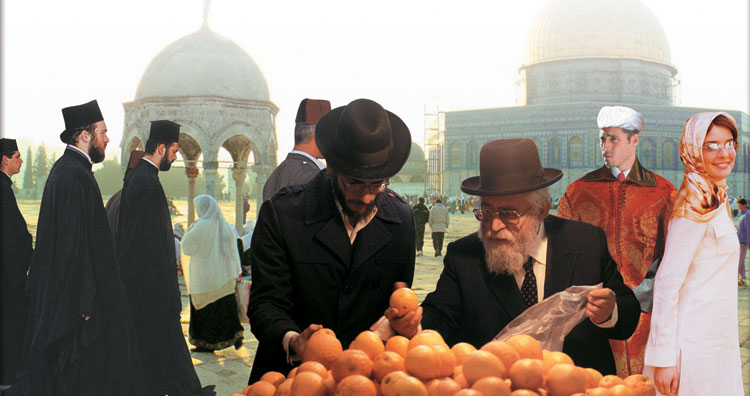 |
Legal Status of the People of the Book in Muslim Societies
 |
The People of the Book living within the Muslim realm were considered dhimmis, rather than prisoners of war, and therefore were guaranteed certain legal rights. For example, in exchange for paying the jizya tax, their lives and property were guaranteed, and they enjoyed freedom of religious belief and thought, were exempted from military service, and had the right to their own law courts to resolve their disputes. On some occasions, their taxes were refunded.
This tax on non-Muslims has sometimes been misinterpreted in order to portray it as an injustice. But as we have seen above, the protections that they secured after paying it were hardly insignificant. In addition, the collected money was used to protect the non-Muslims’ rights and future, and to take care of their needy coreligionists. Studying the dhimmis’ status and the Muslim administrators’ practices in this regard reveal the truth of the matter.
Our Prophet (may Allah bless him and grant him peace) said: »I am the adversary of those who wrong the dhimmis or burden them with a load they cannot carry.« According to this principle, Muslims considered it their duty to protect those non-Muslims living under their rule. The Muslims’ sense of justice dictates that dhimmis come under the state’s protection. During the reign of Umar ibn al-Khattab(ra), the Muslims signed an agreement with the Christians of Hira. One of the provisions stated: »If any of their men become weak and old, or inflicted with a disease, or was rich and had become poor, the jizya shall be lifted from him, and he and his family shall be supported by the public treasury [bayt al-mal] so long as he resides in the dar al-Islam.20This clearly reveals the attitude of the Muslim authorities toward the dhimmis. When non-Muslims could not pay their taxes, they were supported by public funds, which were an important aspect of state support. Before signing the agreement he had made with the people of Damascus, Umar revealed the sensitivity of Muslims toward the jizya and non-Muslims:
My own opinion and on the Book of Allah [citing Q. LIX, 6-8] is that you should keep what has been given by Allah to you [of the land] in the hands of its people …If the jizya is paid by them [the dhimmis], you should require no more of them … For if we divide the land [among us], nothing will be left for our descendants …[If the land is left with its people,] the Muslims will be able to live on its produce. You may therefore impose on them [the dhimmis] the jizya, never to take them as prisoners, nor to do any injustice or harm to them, or to take any of their property unless you have a [valid legal] claim to it. You must fulfill the obligations you accepted in accordance with your agreement with them.21
They were only ordered to worship Allah, making their religion sincerely His as people of pure natural belief, and to perform prayer and give the alms – that is the religion of the correct.
(Surat Al-Bayyina: 5)
As we have seen, genuine Muslims who abide by the Qur’an’s morality considered it their responsibility to protect the lives, property, and peace of non-Muslims. Once, during a battle with the Byzantine army, the situation became so untenable that Muslims could no longer provide the necessary protection to Christians. Thus, Muhammad, our Prophet (may Allah bless him and grant him peace), ordered the jizya to be returned to them.22
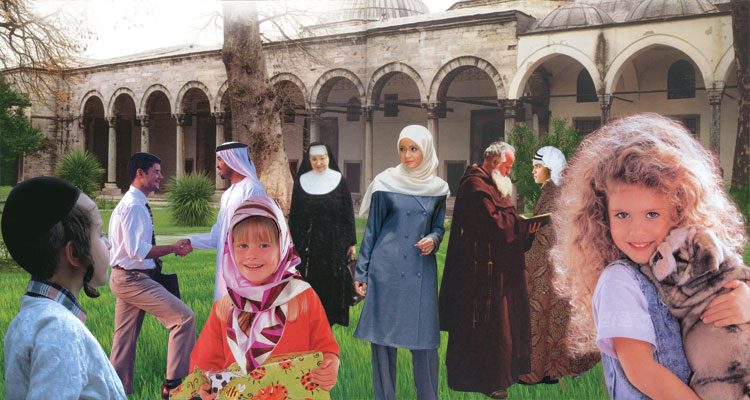 |
The amicable history between Muslims and Jews and Christians is an example for the present. The Islamic code of ethics requires that non-Muslims be treated with affection, that their values and beliefs be respected, and that an environment in which peaceful coexistence is possible be created. Therefore, the spread of this code, as well as efforts to correct some misguided practices claiming to be Islamic, will play an important role.
In addition, Muslims’ love and understanding must find an appropriate response in the Jewish and Christian communities, because Allah also commands them to love all other people and to be the leaders in all matters of good and peace.
Those of you possessing affluence and ample wealth should not make oaths that they will not give to their relatives and the very poor and those who have migrated in the way of Allah. They should rather pardon and overlook. Would you not love Allah to forgive you?... (Surat An-Nur: 22)
Footnotes
6. (Kütübi Sitte Muhtasarı Tercüme ve Şerhi, 7. cilt) ![]()
7. (Huccetül İslam İmam Gazali, İhya'u Ulum'id-din, 2.cilt) ![]()
8. İbn Hişam, Ebu Muhammed Abdulmelik, Es-Siretü'n-Nebeviyye, Daru't-Türasi'l-Arabiyle, Beyrut, 1396/1971, II/141-150; Yrd. Doç. Dr. Orhan Atalay, Doğu-Batı Kaynaklarında Birlikte Yaşama, Gazeteciler ve Yazarlar Vakfı Yayınları, İstanbul, 1999, s. 95 ![]()
9. (Majid Khoduri, İslam'da Savaş ve Barış, Fener Yayınları, İstanbul, 1998, s. 209-210) ![]()
10. Majid Khoduri, İslam'da Savaş ve Barış, Fener Yayınları, İstanbul, 1998, s. 223 ![]()
11. Levent Öztürk, Asr-ı Saadetten Haçlı Seferlerine Kadar İslam Toplumunda Hıristiyanlar, İz Yayıncılık, istanbul, 1998, s. 114-115 ![]()
12. Frend, 289; Hamidullah, İslam Peygamberi, II. 920; Levent Öztürk, Asr-ı Saadetten Haçlı Seferlerine Kadar İslam Toplumunda Hıristiyanlar, İz Yayıncılık, istanbul, 1998, s. 55 ![]()
13. Mark Cohen, Haç ve Hilal Altında Ortaçağlarda Yahudiler, Sarmal Yayınevi, İstanbul, Nisan 1997, s.185 ![]()
14. Osman Turan, Türk Cihan Hakimiyeti Mefkuresi Tarihi, İstanbul 1969, s. 193 ![]()
15. Abrahom Danon, Yossef Daath Dergisi, sayı 4; Naim Güleryüz, Türk Yahudileri Tarihi I, Gözlem Gazetecilik Basın ve Yayın A.Ş, İstanbul, 1993 ![]()
16. Felipe Torroba, Bernaldo de Quiros, Les Juifs Espagnols, Madrid, 1964, s. 17 ![]()
17. İlhan Bardakçı, "Biz Hiç Irk Olmamışız", Tercüman, 7 Mayıs 1983 ![]()
18. Levent Öztürk, Asr-ı Saadetten Haçlı Seferlerine Kadar İslam Toplumunda Hıristiyanlar, İz Yayıncılık, istanbul, 1998,s. 437 ![]()
19. Levent Öztürk, Asr-ı Saadetten Haçlı Seferlerine Kadar İslam Toplumunda Hıristiyanlar, İz Yayıncılık, istanbul, 1998, s.188 ![]()
20. Majid Khoduri, İslam'da Savaş ve Barış, Fener Yayınları, İstanbul, 1998, s. 214 ![]()
21. Majid Khoduri, İslam'da Savaş ve Barış, Fener Yayınları, İstanbul, 1998, s. 216 ![]()
- Introduction
- 1. How Should The Stance 0f Muslims Be Towards The People of The Book According To The Qur’an and The Sunnah?
- 2. Muslims and The People of The Book In The History of Islam
- 3. Uniting Against The Threat of Radicalism
- 4. Common Principles of Faith In The Divine Faiths
- 5. Common Prayers and Common Moral Values in The Divine Faiths
- 6. Uniting in Ideological Debate
- 7. Belief in Hazrat Mahdi (pbuh) and The Messiah(pbuh) in The Divine Faiths
- 8. Come, Let Us Unite
- Conclusion
